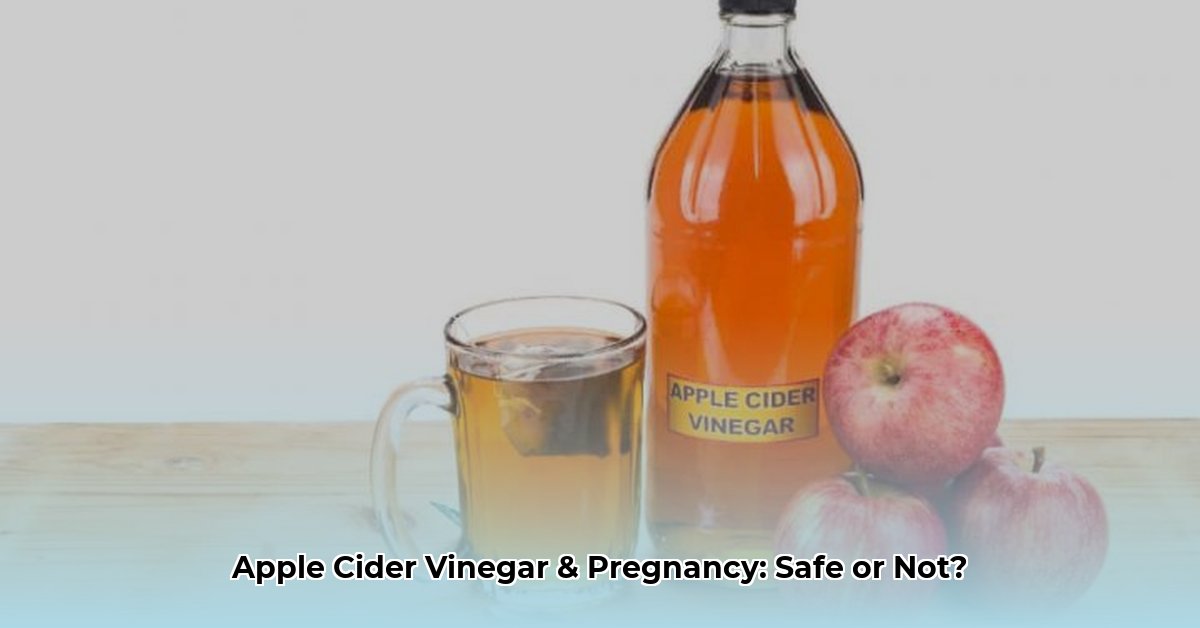Pregnancy comes with a whirlwind of advice, and it can be challenging to sift through what’s helpful and what’s hype. Apple cider vinegar (ACV) often pops up as a supposed natural remedy for various ailments, but its safety and effectiveness during pregnancy require careful consideration. This guide provides an evidence-based look at ACV, addressing common misconceptions and empowering you to make informed decisions.
Is ACV Safe During Pregnancy?
The short answer? It depends. The type of ACV and how you use it makes all the difference. Let’s clarify the facts.
Pasteurized vs. Unpasteurized: A Critical Distinction
The most important factor is whether the ACV is pasteurized or unpasteurized. Unpasteurized ACV, sometimes labeled “raw” or “with the mother,” may contain harmful bacteria like E. coli and Listeria, posing serious risks during pregnancy. Pasteurization, a heat treatment process, eliminates these harmful bacteria, making pasteurized ACV a safer choice if your doctor approves its use.
Debunking the Benefits: What the Science Really Says
While anecdotal reports suggest ACV might alleviate morning sickness, heartburn, and aid digestion during pregnancy, scientific evidence is limited. Some animal studies suggest potential benefits for blood sugar regulation, but we need more research—specifically on pregnant women—to draw definitive conclusions. It’s important to remember that personal anecdotes, while potentially helpful for individuals, don’t replace scientific evidence.
Potential Risks: Even with Pasteurized ACV
Even pasteurized ACV carries potential risks. Its acidity can erode tooth enamel over time, especially if consumed undiluted. ACV could also interact with some medications. If you have pre-existing digestive issues like acid reflux or gastritis, ACV might worsen these conditions. A Registered Dietitian we consulted emphasized, “While some patients find ACV helpful for certain symptoms, it’s crucial to prioritize safety. Consult your healthcare provider before using ACV, especially during pregnancy.”
Using ACV Safely (If Your Doctor Approves)
If your doctor gives you the green light, moderation and dilution are key. Dilute 1-2 tablespoons of pasteurized ACV in a large glass of water. Start with a small amount and monitor how your body reacts. Never drink ACV undiluted. For topical use (e.g., diluted for acne), discuss the concentration and frequency with your doctor.
Expert Advice: A Doctor’s Perspective
OB/GYNs generally advise caution when it comes to ACV during pregnancy. Dr. [OB/GYN’s Name], a leading expert in maternal-fetal medicine, explains, “While some women might find ACV helpful, we recommend sticking to remedies with established safety profiles during pregnancy. Ginger and over-the-counter antacids, for example, are often effective for nausea and heartburn, respectively. Always discuss new additions to your diet or routine with your doctor.” This underscores the importance of personalized guidance.
Safer Alternatives for Pregnancy Discomfort
For many common pregnancy symptoms, safer alternatives have more scientific support.
- Morning Sickness: Ginger has a long history of use for nausea and is generally considered safe during pregnancy. [Link to reputable source on ginger and pregnancy]
- Heartburn: Over-the-counter antacids can provide relief. [Link to reputable source on antacids and pregnancy]
- Gestational Diabetes: Your doctor can recommend a tailored diet and exercise plan to manage blood sugar levels. [Link to reputable source on gestational diabetes management]
ACV and Pregnancy: A Quick Guide
| Potential Benefit (Mostly Anecdotal) | Potential Risks | Safe Usage Guidelines |
|---|---|---|
| May ease morning sickness | Can erode tooth enamel, medication interactions, digestive problems | Dilute 1-2 tbsp in water, up to twice daily (with doctor’s approval) |
| May provide heartburn relief | Same as above | Use diluted, with doctor’s approval |
| Some believe it aids digestion | Same as above | Always consult your doctor first |
The Bottom Line
While ACV might hold some promise, it’s crucial to prioritize safety during pregnancy. Open communication with your healthcare provider is essential. Discuss any concerns or questions you have about ACV, or any other remedies, to ensure you’re making the best choices for you and your baby.
- Leak-Proof Glass Food Containers with Locking Lids Keep Food Fresh - February 3, 2026
- Glass Storage Containers With Glass Lids That Lock for Freshness - February 2, 2026
- Locking Glass Food Storage Containers for Organized and Fresh Meals - February 1, 2026










